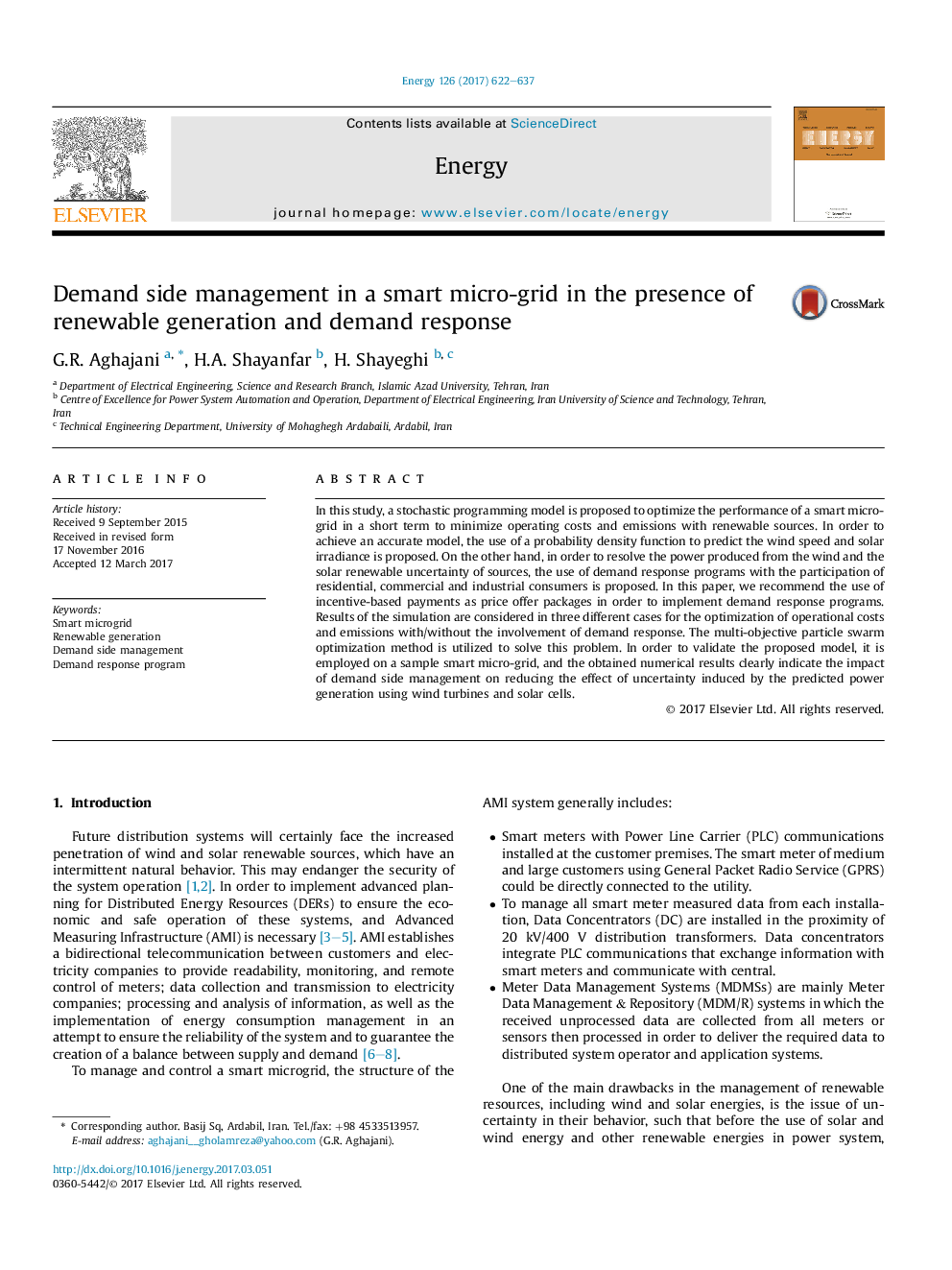| کد مقاله | کد نشریه | سال انتشار | مقاله انگلیسی | نسخه تمام متن |
|---|---|---|---|---|
| 5477009 | 1521425 | 2017 | 16 صفحه PDF | دانلود رایگان |
عنوان انگلیسی مقاله ISI
Demand side management in a smart micro-grid in the presence of renewable generation and demand response
ترجمه فارسی عنوان
مدیریت سمت تقاضا در یک شبکه هوشمند در صورت نیاز تولید و تقاضای واکنش تجدیدپذیر
دانلود مقاله + سفارش ترجمه
دانلود مقاله ISI انگلیسی
رایگان برای ایرانیان
کلمات کلیدی
میکرو گرید هوشمند نسل تجدیدپذیر، مدیریت سمت تقاضا، برنامه واکنش تقاضا،
ترجمه چکیده
در این مطالعه، یک مدل برنامه ریزی تصادفی برای بهینه سازی عملکرد یک شبکه کوچک هوشمند در کوتاه مدت برای کاهش هزینه های عملیاتی و انتشار با منابع تجدید پذیر پیشنهاد شده است. برای دستیابی به یک مدل دقیق، استفاده از یک تابع چگالی احتمال برای پیش بینی سرعت باد و تابش خورشید پیشنهاد شده است. از سوی دیگر، برای حل و فصل قدرت تولید شده از باد و عدم اطمینان ناشی از انرژی خورشیدی، استفاده از برنامه های پاسخ تقاضا با مشارکت مصرف کنندگان مسکونی، تجاری و صنعتی پیشنهاد می شود. در این مقاله توصیه می کنیم از پرداخت های مبتنی بر انگیزه به عنوان پیشنهادات قیمت پیشنهاد برای اجرای برنامه های پاسخ تقاضا استفاده کنید. نتایج شبیه سازی در سه مورد مختلف برای بهینه سازی هزینه های عملیاتی و انتشار با / بدون دخالت پاسخ تقاضا در نظر گرفته شده است. برای حل این مشکل، روش بهینه سازی ذرات چند هدفه مورد استفاده قرار می گیرد. به منظور اعتبارسنجی مدل پیشنهادی، در یک میکروسکوپ هوشمند نمونه مورد استفاده قرار می گیرد، و نتایج عددی حاصل از نتایج به وضوح نشان می دهد که تاثیر مدیریت تقاضا بر کاهش اثر نااطمینانی ناشی از تولید پیش بینی شده انرژی با استفاده از توربین های بادی و سلول های خورشیدی .
موضوعات مرتبط
مهندسی و علوم پایه
مهندسی انرژی
انرژی (عمومی)
چکیده انگلیسی
In this study, a stochastic programming model is proposed to optimize the performance of a smart micro-grid in a short term to minimize operating costs and emissions with renewable sources. In order to achieve an accurate model, the use of a probability density function to predict the wind speed and solar irradiance is proposed. On the other hand, in order to resolve the power produced from the wind and the solar renewable uncertainty of sources, the use of demand response programs with the participation of residential, commercial and industrial consumers is proposed. In this paper, we recommend the use of incentive-based payments as price offer packages in order to implement demand response programs. Results of the simulation are considered in three different cases for the optimization of operational costs and emissions with/without the involvement of demand response. The multi-objective particle swarm optimization method is utilized to solve this problem. In order to validate the proposed model, it is employed on a sample smart micro-grid, and the obtained numerical results clearly indicate the impact of demand side management on reducing the effect of uncertainty induced by the predicted power generation using wind turbines and solar cells.
ناشر
Database: Elsevier - ScienceDirect (ساینس دایرکت)
Journal: Energy - Volume 126, 1 May 2017, Pages 622-637
Journal: Energy - Volume 126, 1 May 2017, Pages 622-637
نویسندگان
G.R. Aghajani, H.A. Shayanfar, H. Shayeghi,
